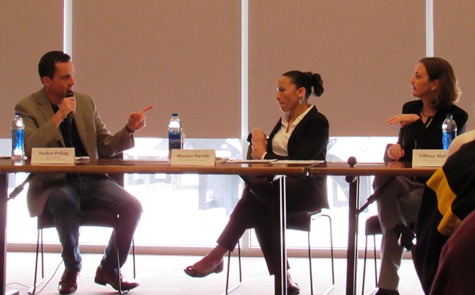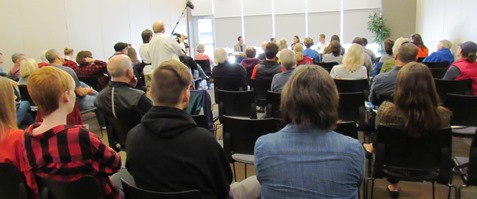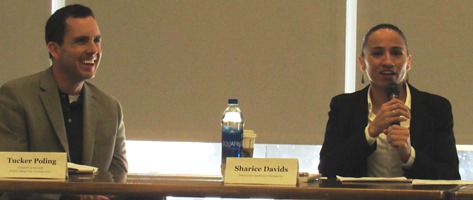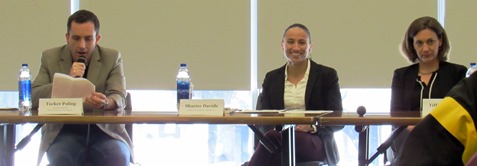
Democratic congressional candidate Sharice Davids called for reform of the nation’s campaign finance system at a forum held Saturday.
She said special-interest campaign funding – millions of corporate dollars flowing into campaigns – should be limited. There were some populist themes throughout the meeting.
Davids: ‘Breakdown in trust’
“So many of us know that this concept of the breakdown in trust, of the lack of political participation, it’s a combination of a feeling often of not being represented well, of showing up when the decision has already been made,” Davids said, “of knowing that it doesn’t matter how often you’re waving your arms around and saying this isn’t right, but it feels like things have not been changing.”
Davids, running for the 3rd District congressional seat, said she has seen in the past few years a lot of enthusiasm among people who are saying, “This is not the government I want.”
“We get the chance, if we don’t like what our government is doing, of doing something about it,” Davids said.
There is a range of options available to citizens, she said, including working with organizations to encourage voter registration, or serving in local government. Davids urged more people to register to vote and help others to register. The voter registration deadline is Tuesday, Oct. 16.
Davids joined in the panel discussion Saturday with Tiffany Muller, president and executive director of End Citizens United, and Davis Hammet, president of Loud Light, on the extensive influence of special interest money on politics. The moderator of the panel was Tucker Poling, an attorney and member of the Prairie Village City Council. The panel was sponsored by the Sharice Davids campaign.
Hammet said the people of Kansas are far different from the political agenda that has been pushed through the state. That is because there is very low participation in elections, particularly among youth. It results in a disconnect between citizens and the government, he added.
“The system is rigged in favor of those having the biggest checkbook,” Muller said.
Muller urged those attending the forum to “dig deeper,” get out and campaign, make phone calls, contribute, vote and get their friends and families to vote.
“We need unprecedented turnout,” Muller said.
Campaign finance underlies other issues
Asked if this was her top campaign issue, Davids said the campaign finance issue underlies the other issues.
“When I think about the campaign finance issues, it’s actually the foundation of so many issues,” she said. The policies of the people who are sent to Washington are influenced by who paid for their campaign, she said.
“It’s like a structural issue in who gets elected because of the money that’s coming in,” she said.
She said her opponent, incumbent Rep. Kevin Yoder, had accepted nearly a half-million in campaign contributions from insurance companies, then gave them tax breaks.
“My hope is we can start to elect folks like myself who are more focused on individual contributions, as a way to make sure that we can actually make health care costs more affordable, that more people are covered, and that public education is a priority,” Davids said.
Davids said Congress needs to protect people with pre-existing conditions. To think there might be legislation that would make it harder for people with pre-existing conditions to get coverage in the future is unacceptable, she said. It has to be done in a way that people will not be priced out, also, she added.
Campaign contributors and dollars
Poling said Davids has had 75,164 contributors, compared to Yoder’s 1,671. While she has 45 times more contributors, Davids does not have 45 times more money, he added. Davids’ contributions are smaller, mostly from individuals.
“We worked ten times as hard just to raise the money we raised,” Davids said. It’s not as much about the money as it is about listening to the concerns of the people, and their small donations are important in expressing their support.
According to Davids, 99.8 percent of her donations are from people, while Yoder’s contributions from individuals are less than half. The average contribution to the Davids campaign was $35, according to her staff.
This last quarter, Davids’ campaign raised more than Yoder’s. Davids raised $2.7 million in the summer, according to her campaign staff, with funds from organizations such as Women Vote! and support from Emily’s List.
During the forum, Davids said that her acceptance of the Women Vote! contributions was not at all the same as accepting corporate contributions.
“Emily’s List is an organization that was designed to help a structural issue that exists that restricts the people who are able to participate in this system,” Davids said. “I feel very proud of being able to go from a first-generation college student raised by a single mom.”
“This is my real life. I came from a family that doesn’t have any money,” Davids said. “Single parents and people who have had to work two jobs, and people who have had to work the entire time they were in school, you know how hard it is. So when I talk about these things, I think about those structural barriers that exist.”
Organizations such as Emily’s List and End Citizen’s United are trying to increase the number of people involved, not restrict them, she said.
“So if we talk about the Koch brothers, whose primary purpose is to put people in office who want to talk about our voting rights as privileges, who want to talk about how we should dismantle the public education system, the Koch brothers and the 50 other people who fund so much of this big money need to have somebody pushing back against them until we can have these kinds of reforms,” Davids said.
“I don’t feel any tension around accepting the support of organizations like Emily’s List, Victory Fund and End Citizens United,” Davids said. “I don’t accept the premise that I need to feel tension because our campaign was able to raise a lot of money, because so much of it came from Emily’s List, because so much of it came from $35 average contributions. To say that raising a lot of money from a whole bunch of people is anything close to the same thing as getting a whole bunch of money from the Koch brothers is wrong, and it’s exactly what we’re talking about with misinformation and falsehoods, and it’s a false equivalency, and I just don’t accept it.”
Dollars and cents in campaign finance
According to the website from the Center for Responsive Politics, opensecrets.org, $3.07 million was raised in the 3rd District Congressional campaign through July 18, with more campaign finance reports expected shortly.
Yoder had more funding going into the general election. As of the July 18 campaign finance report, according to the Center for Responsive Politics, Yoder had raised $2.7 million and spend $1.37 million, with $1.79 million on hand, while Davids had raised $344,704 and spent $216,947, with $127,758 on hand. However, the campaigns have reported a turnaround in campaign finance with more funding flowing into Davids’ campaign after the primary.
Yoder listed large donations in the July report from political action committees for law firms, from a payday loan company and other businesses. In September, it was announced that the NRCC, a PAC from House Republicans, would be sending Yoder and other Kansas candidates $1.8 million, but in October, it was reported that NRCC canceled $1 million in advertising for Yoder.
Polls also have showed Davids out in front of Yoder, with one poll from the New York Times showing Davids leading by eight points, 51 to 43 percent, with 6 percent undecided. (https://www.nytimes.com/interactive/2018/upshot/elections-poll-ks03-1.html?fbclid=IwAR0AMO70OfqXlWnSVlG19-2eEbFWMSIVnBiQGicyKyrqEeluU3U0SzfXL3I)
Both Davids and Yoder are lawyers. Davids, a former White House fellow and one of many women seeking congressional offices this year, won in a crowded primary field. She grew up in Leavenworth, Kansas, and attended Johnson County Community College, University of Missouri at Kansas City, and Cornell. Yoder, originally from Yoder, Kansas, and a University of Kansas graduate, has been in office since 2010. The 3rd District voted for Hillary Clinton in 2016.
There were some remarks at the forum about wealthy persons who serve in Congress, but Yoder is not from a wealthy background. He was listed by the Washington Post as 17th from the bottom of more than 400 members of Congress in personal wealth in 2010. (http://www.washingtonpost.com/wp-srv/business/congress-members-worth/index.html?noredirect=on&fbclid=IwAR0oMskqzPiYfOtBR00bSPv2UBMgD-_5WkAxj-2J0s5T51IMWGLeOwkSAAA). Davids is from a middle-class background.
When asked about why she did not attend the recent Congressional Forum with the Kansas City Kansas Chamber of Commerce or the forum of the Johnson County Bar Association, where Yoder was present, Davids said she agreed to have a free and open debate Oct. 29 sponsored by the Kansas City Star that will be televised, so that the largest number of people could see it. The other events were dinners where people had to pay to get in.
The panel discussion Saturday was held at the Matt Ross Community Center in Overland Park, with more than 50 attending. It originally was scheduled to be held at the South Branch Library in Kansas City, Kansas, but Davids’ campaign staff said it was moved because of the large number of participants who registered.





Too much TV exposer how’s she paying for it? ……. I won’t even go there because you know what you have with Kevin Yoder; Sharice Davids? Scares me and that’s all I have to say